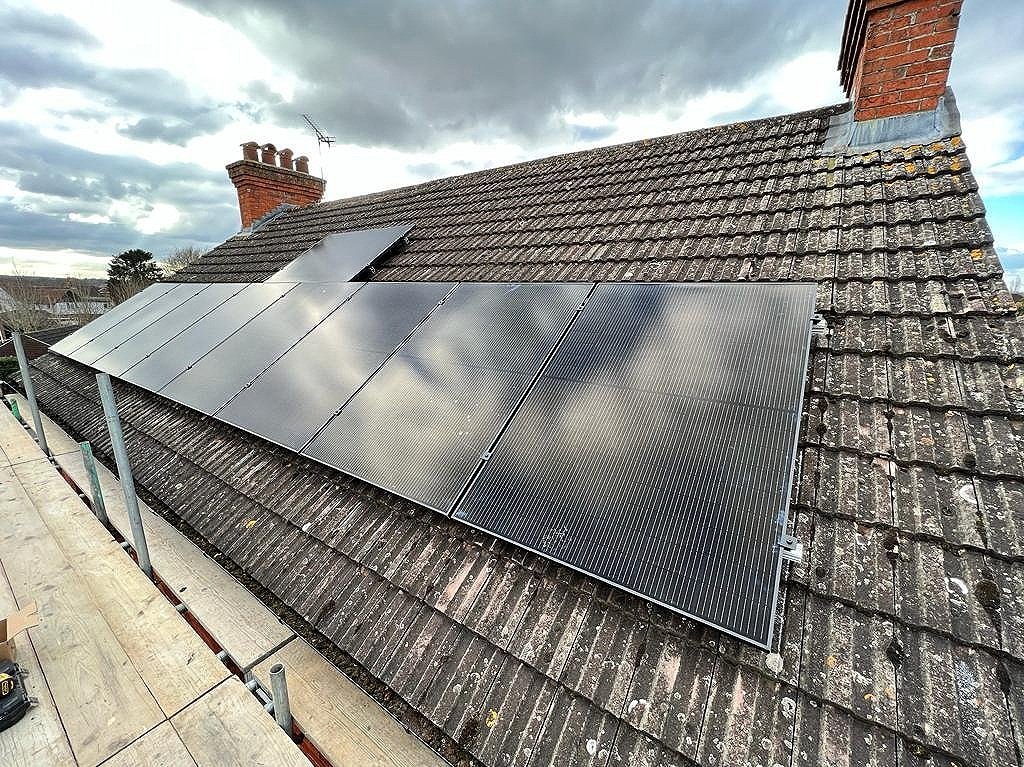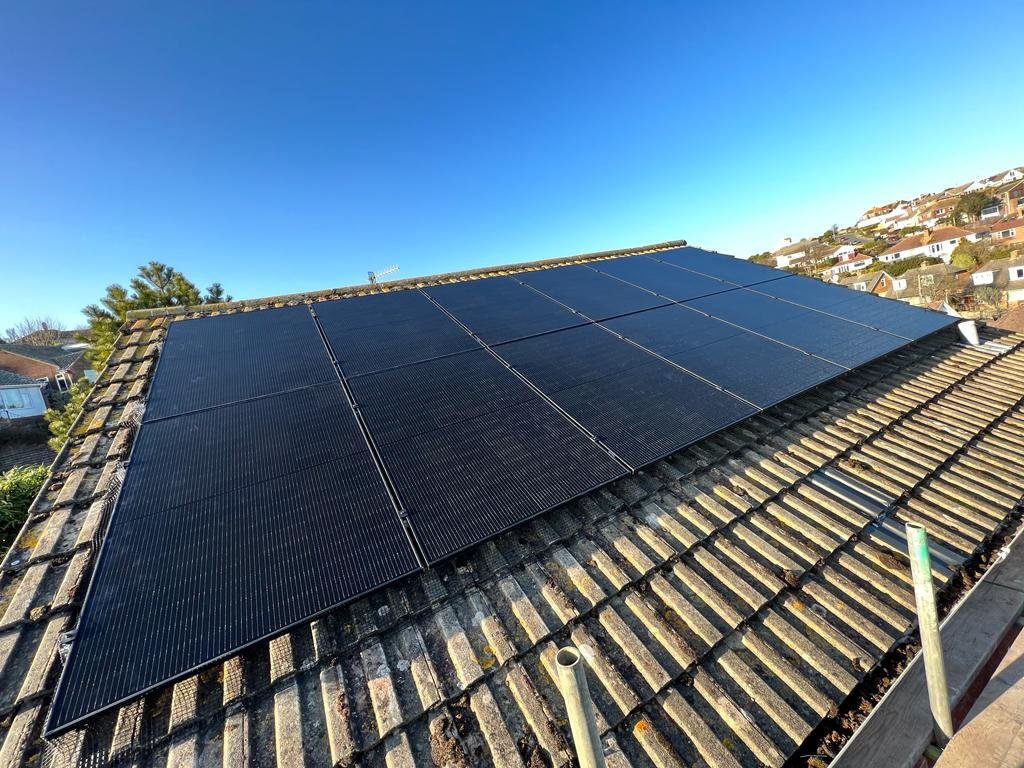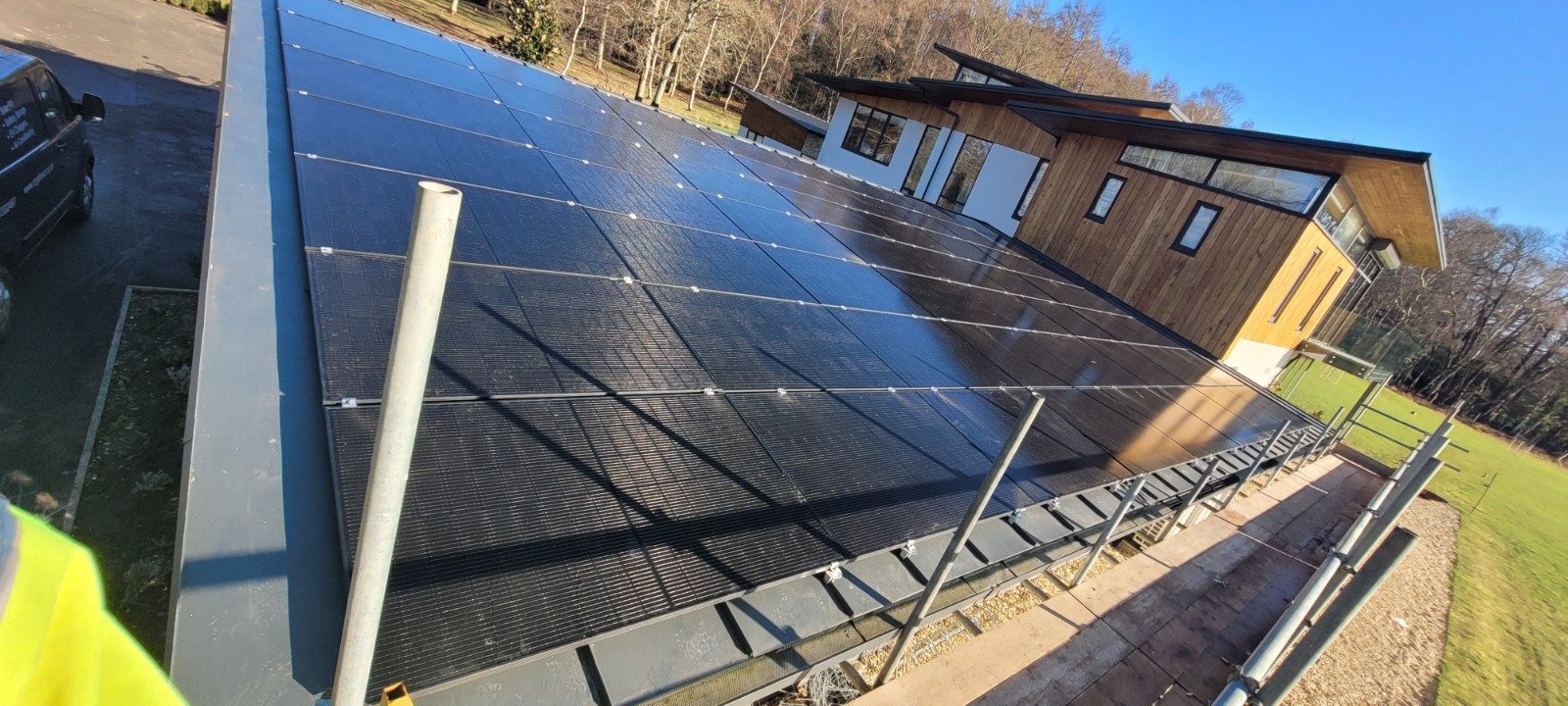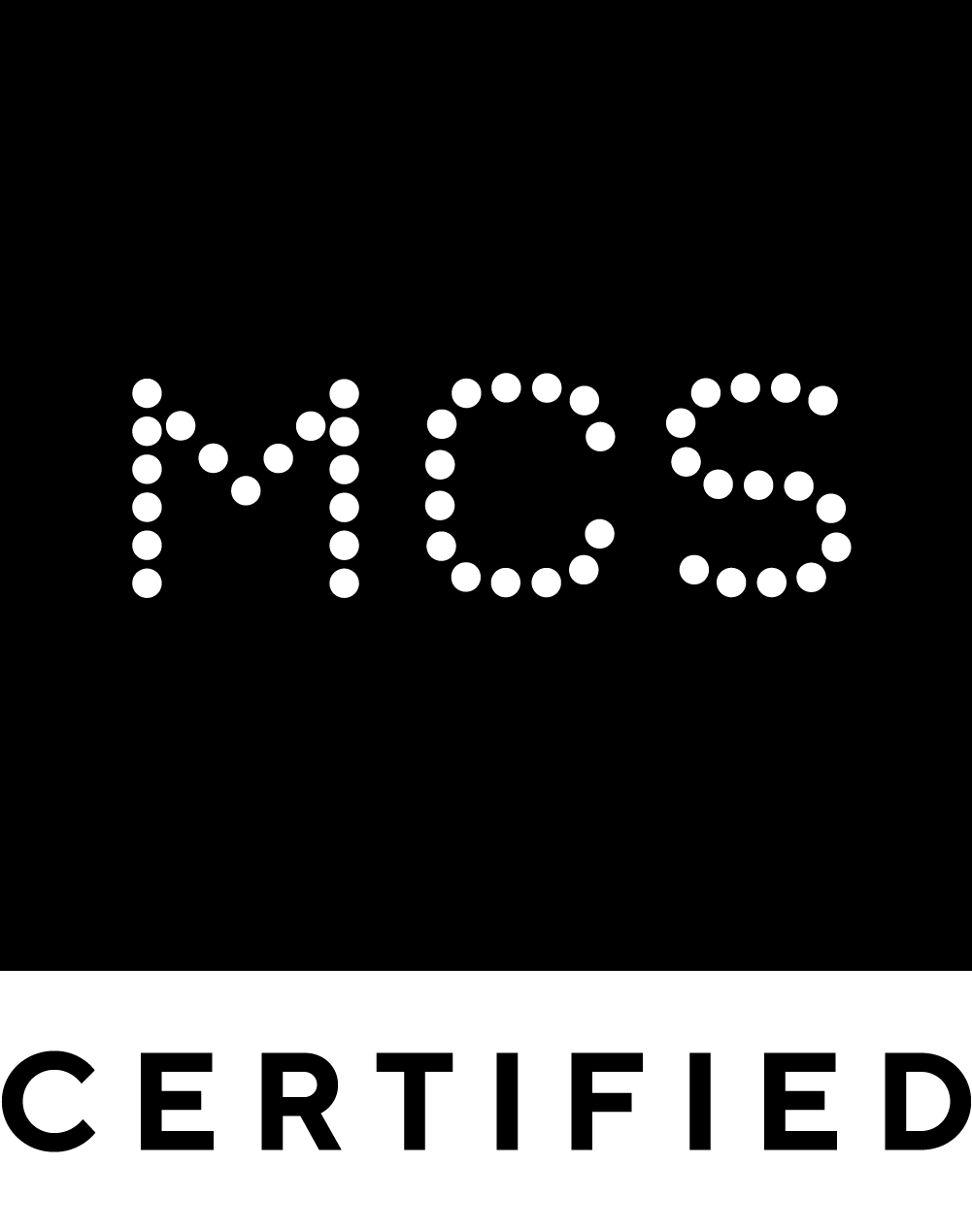What are the best solar panels for houses in the UK?
Popular solar panels compared and what features to look out for
What’s the best house solar panel system?
Popular brands of residential solar panels are Perlight, JA Solar and Jinko. The best house solar panel for you will depend on your roof space and how much power you want to get each day from your system.
The criteria in the picture has been used to establish what the best solar panels UK are.
Popular Solar Panel Specifications
| Panel Model | Panel Efficiency | Operating Temperature | Warranty |
|---|---|---|---|
| 400W PERC Half-cell Black Module | 19.9% | -40 to +85 | 12-year product, 25-year power |
| PLM-400OM2B-66 400W DELTA SERIES Monocrystalline | 21.1% | -40 to +85 | 30-year product, 30-year power |
| SunPower Maxeon 400W SPR-MAX3-400 | 22.6% | -40 to +85 | 25-year product, 25-year power |
| Cheetah HC 60M 325-345 Watt | 19.26% | -40 to +85 | 12-year product, 25-year power |
| Ultra-V HALF-CELL BIFACIAL MODULE STPXXXS - C72/Pmh+ 530-550W | 21.3% | -40 to +85 | 12-year product, 30-year power |
Here are some things to consider:
1. Most Efficient Solar Panels
The efficiency of the panel is how much sunlight the panel can turn into power. For example, if an efficient solar panel has an efficiency rating of 19%, it can turn 19/100% of the sunlight it gets into electricity.
The efficiency of a panel ranges from 19-23% depending on the brand and model. No panel is 100% efficient as the tech doesn’t exist yet. 19-23% may not seem like a lot in the grand scheme of things but this is the result of years of research and billions of pounds in investment. 19-23% will power your home and give you excess energy. The Longi Hi-MO 6 Series is the most efficient solar panel due to its Hybrid Passivated Back Contact (HPBC) technology which eliminates front-side busbars to increase efficiency.
Remember, the more efficient the panel the more energy you’ll convert and the more electricity you’ll have for your home or business.
2. Solar Panels Wattage
The maximum power output of a solar panel under standard test conditions (STC) is referred to as its wattage which is a key factor in solar panel systems. For example a 390W panel can produce 390 watts but a 400W panel can produce 400 watts. A higher wattage panel generates more power. If you don’t have much space on your roof you may opt for fewer panels with higher wattage.
3. Solar Panels Sizing
Between brands the size of domestic solar panels will vary however the average size of a panel is around 5.4 feet by 3.25 feet. Make sure you have enough roof space for the brand you would like.
If you have a smaller roof you may want panels with higher wattage to get more power per square meter. If you have a bigger roof you may not be as fussy about the wattage of the panels
4. Panel Safety Features
Solar panels conduct and carry electricity. It’s important to get panels from a reputable supplier and brand with warranties and safety features to prevent issues such as electrocution, electrical fire or damage to your inverter. A safe solar installation is crucial for the long term performance and safety of your solar panel system. Also explore financial support options for solar installations such as government schemes and resources through local councils and energy suppliers in the UK to make going solar more affordable.
You need to get MCS approved panels so you can get an MCS certificate and access the SEG scheme to get paid for your exports.
A List of Key Safety Features of a Solar Panel:
Fire Resistance: Solar panels are fire resistant. They are tested to ensure they can withstand high temperatures and are less prone to spark or spread flames. This is especially important as solar panels are exposed to sunlight and possible electrical currents.
Overvoltage Protection: Overvoltage protection devices are integrated into solar panels. These devices protect the panels and connected electrical equipment by limiting voltage levels to safe levels. This protects against power surges and lightning strikes that can occur in the grid.
Electrical Isolation: Solar panels have electrical isolation features to ensure the direct current (DC) generated by the panels does not cause electric shock or damage to the electrical system. When maintenance or repairs are required panels can be switched off to prevent electric shock. Never make changes to your system without turning off your system first.
Grounding Protection: Ground fault protection is to detect any electrical current leakage from the solar panel array to the ground. It’s often built into the inverter or the system’s electrical wiring board and reduces the risk of electric shock.
Durability and Weather Resistance: Solar panels are built to withstand extreme weather conditions such as high winds, hail and extreme temperatures. To ensure long term reliability and safety they are made of sturdy materials such as tempered glass and aluminium frames.
Warranty and Output Warranty
Panels have long warranties. The average panel warranty is 25 years. Some have even longer warranties such as Perlight panels which have a 30 year warranty. Also consider the warranty on your solar inverter as it typically needs to be replaced after 12 years.Also look at the linear output warranty. The linear output warranty will be shorter but guarantee a minimum output of energy for your system. The percentage of guaranteed output diminishes at a steady pace year after year. For example 98% the first year, 97% the second year, 96% the third year and so on.
Top Solar Panel Recommendations for UK Homes
When choosing the best solar panels for your UK home there are several factors to consider. Here are our top recommendations based on efficiency, cost and overall performance.
Best Overall: Longi Hi-MO 6 Series
The Longi Hi-MO 6 Series is one of the most efficient solar panels available with an impressive efficiency rating of up to 23.2%. This high efficiency means it can convert more sunlight into electricity, perfect for UK homes where sunlight can be unpredictable. Also the Longi Hi-MO 6 Series is known for its durability and reliability with a 25 year warranty and up to 40 year lifespan. This combination of efficiency and longevity makes it a top choice for homeowners wanting to maximise their solar energy production.
Best for Large Households: 555W JA Solar Mono PERC Half-Cell GR MC4
For larger households with higher energy demands the 555W JA Solar Mono PERC Half-Cell GR MC4 is the best option. With a high power rating of 555W this solar panel can produce a lot of electricity so even homes with high energy consumption can meet their needs. The panel also has an efficiency rating of up to 22.5% making it one of the most efficient on the market. This combination of high power output and efficiency makes the 555W JA Solar Mono PERC Half-Cell GR MC4 perfect for large households looking to reduce their energy bills and carbon footprint.
Solar Panel Installation and Maintenance
Solar Panel Installation Options
When it comes to installing solar panels homeowners have several options to consider. The most common installation options are:
Roof-mounted solar panels: This is the most popular installation option where solar panels are installed directly onto the roof of a house. This method maximizes space and makes use of the roof’s exposure to sunlight.
Ground-mounted solar panels: This option involves installing solar panels on a free standing structure in a yard or field. Ground-mounted systems are perfect for properties with lots of land and can be positioned for maximum sun exposure.
Solar panel mounting systems: These allow homeowners to install solar panels on a flat roof or on a wall. They offer flexibility in placement and can be adjusted to capture the most sunlight.
When choosing an installation option consider the roof size, orientation and condition. Homeowners should also consult with a professional solar panel installer to determine the best option for their specific needs. Professional installers can provide valuable insights into the most efficient and cost effective solution for your home.
Maintaining Your Solar Panel System
Regular maintenance is key to ensuring a solar panel system operates efficiently and effectively. Here are some maintenance tips:
Clean the solar panels regularly: Dust, dirt and debris can accumulate on the panels and reduce their efficiency. Cleaning them periodically will ensure they capture maximum sunlight.
Check the solar panels for damage: Inspect the panels for any signs of wear and tear, such as cracks or loose connections. Addressing these issues promptly will prevent bigger problems.
Ensure the solar inverter is working correctly: The inverter is a critical component of the solar panel system, converting DC electricity generated by the panels into AC electricity for home use. Regular checks will ensure it runs smoothly.
Monitor the solar panel system’s performance: Keep an eye on the system’s output to ensure it meets expected performance levels. Any significant drop in performance could mean there’s an issue that needs addressing.
Homeowners can also hire a professional solar panel maintenance service to ensure their system is running at optimal levels. Professional maintenance will extend the lifespan of the system and ensure it continues to provide maximum energy savings.
Solar Panel Costs and Incentives
One of the main concerns for homeowners considering solar panels is the cost. Here’s a breakdown of the costs and incentives for solar panels in the UK.
Homeowners can use solar panel grants to offset the initial cost. These grants include the Energy Company Obligation (ECO4) and local council grants which provide funding to eligible households. By using these grants homeowners can reduce the cost of installing solar panels and enjoy long term energy savings. It’s also important to choose reputable solar panel installers based on criteria such as customer reviews, warranties and industry experience. This will ensure the installation is done correctly and efficiently and gives you peace of mind and maximises the benefits of your solar energy system.
How Much Do Solar Panels Cost in the UK?
Solar panel costs in the UK vary depending on the type and quality of the panels and the size of the system. On average a domestic solar panel system will cost between £5,000 to £10,000. But with government incentives and energy savings the cost of solar panels can be significantly reduced. Solar PV panels offer many benefits including financial assistance and grants available to UK households looking to reduce installation costs and maximise savings from solar investments.
There are several incentives available to homeowners who install solar panels:
Smart Export Guarantee (SEG): This scheme allows homeowners to sell excess energy back to the grid and earn up to 5.38p/kWh.
Renewable Heat Incentive (RHI): This scheme provides a quarterly payment to homeowners who install renewable heat technologies, including solar thermal systems.
Energy Company Obligation (ECO): This scheme provides funding to low-income households to install energy efficient measures, including solar panels.
In addition to these incentives homeowners can also save money on their energy bills by generating their own electricity. According to the Energy Saving Trust a typical solar panel system will save homeowners up to £400 per year on their energy bills.
Overall while the upfront cost of solar panels may seem high the long term savings and incentives make it a worthwhile investment for many UK homeowners.
Smart Export Guarantee (SEG) and Other Incentives
The Smart Export Guarantee (SEG) is a government scheme that allows homeowners to sell excess energy generated by their solar panel system back to the grid. Homeowners can earn up to £745 per year through the SEG scheme, making it a great option for those looking to maximise their investment in solar technology.
Other incentives for installing solar panels:
Renewable Heat Incentive (RHI) scheme: This scheme provides financial support for homeowners who install renewable heat technologies, such as solar thermal systems. It offers quarterly payments to help offset the initial installation costs.
Energy Company Obligation (ECO) scheme: This scheme provides funding for low-income households to install energy efficient measures, including solar panels. It aims to reduce energy bills and improve energy efficiency in homes.
Homeowners should talk to a solar panel installer to see which incentives they are eligible for. Using these schemes can reduce the overall cost of solar panels and maximise the return on investment.
Battery Storage and Solar PV Systems
Is a Battery a Good Idea?
Adding a battery to a solar PV system can be a good idea for several reasons:
Energy storage: A battery allows homeowners to store excess energy generated by their solar panel system during the day for use at night or during power cuts. This gives a continuous power supply and reduces reliance on the grid.
Increased efficiency: A battery optimises the performance of a solar panel system by storing excess energy and reducing energy waste. So more of the energy generated is used rather than wasted.
Cost savings: A battery can help homeowners save money on their energy bills by reducing their reliance on the grid. By using stored energy during peak times homeowners can avoid higher electricity rates.
However adding a battery can also increase the upfront cost of a solar panel system. Homeowners should talk to a solar panel installer to see if a battery is a good option for them. It’s worth noting that batteries can add £5,000 to £9,500 to the cost of a solar panel system but can also provide significant benefits including increased efficiency and cost savings.
By weighing up the benefits and costs homeowners can make an informed decision on whether to add a battery to their solar PV system.
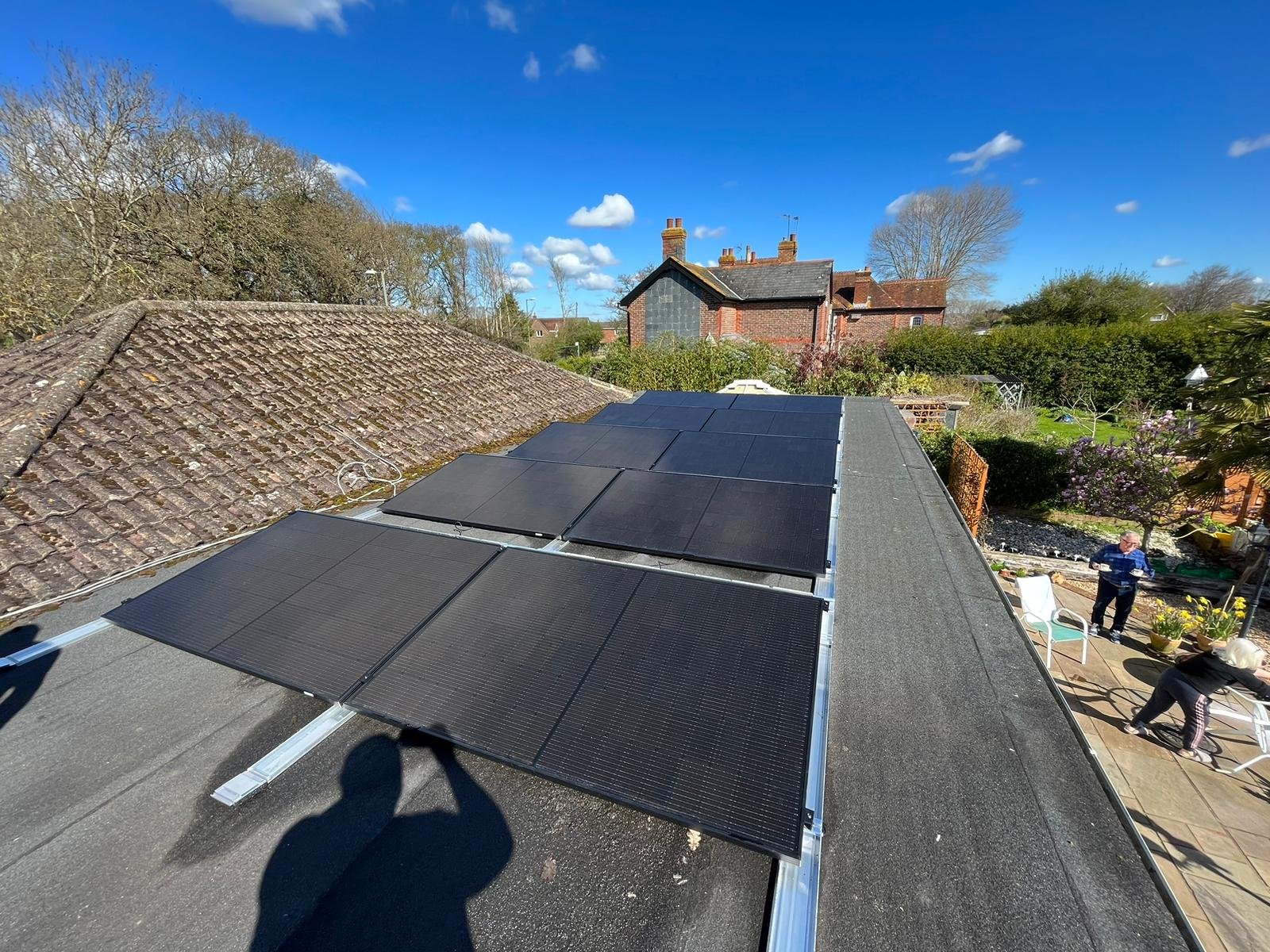
CRG’s Solar Packages
Solar Panel System Packages
Find solar panel installation costs with CRG direct. Our full system installs start from £6300. Please enquire to get a free quote for your home.
8 Panel System and Inverter
(Includes MCS certificate and full installation.)
Starts from £6300
-
We use a range of products depending on stock. We can supply products such as GivEnergy, Sunsynk, Growatt and more.
Please get in touch for up to date advice.
10 Panel System and Inverter and 5.12kwh Battery
(Includes MCS certificate and full installation.)
Starts from £9561
-
We use a range of products depending on stock. We can supply products such as GivEnergy, Sunsynk, Growatt and more.
Please get in touch for up to date advice.
5.12kwh Battery and 3.6kW Inverter
(Includes MCS certificate and full installation.)
Starts from £4550
-
We use a range of products depending on stock. We can supply products such as GivEnergy, Sunsynk, Growatt and more.
Please get in touch for up to date advice.
“Prices are fully installed including mounting kit and HIES guarantee as well as registered with MCS, so a proper job as they say!”


